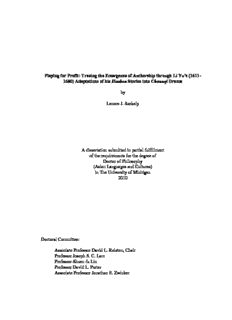Table Of ContentPlaying for Profit: Tracing the Emergence of Authorship through Li Yu’s (1611-
1680) Adaptations of his Huaben Stories into Chuanqi Drama
by
Lenore J. Szekely
A dissertation submitted in partial fulfillment
of the requirements for the degree of
Doctor of Philosophy
(Asian Languages and Cultures)
in The University of Michigan
2010
Doctoral Committee:
Associate Professor David L. Rolston, Chair
Professor Joseph S. C. Lam
Professor Shuen-fu Lin
Professor David L. Porter
Associate Professor Jonathan E. Zwicker
© Lenore J. Szekely
ACKNOWLEDGMENTS
I would like to acknowledge the wealth of support I have appreciated throughout
this project. My graduate studies would not have been possible were it not for the
generosity of the Department of Asian Languages and Cultures and the Center for
Chinese Studies. The encouragement of my friends and mentors has fueled the growth of
this dissertation from conception to completion, for which I am tremendously grateful. In
particular, I would like to give a shout-out to Elizabeth Armstrong, friend and running
partner, for being a receptive sounding-board for my frustrations and a cheerleader for
my progress. To my sister, Rachel, I give thanks for doing it first, and for Vivian, my
most joyful inspiration. For bringing humour to the study of Chinese drama, I would like
to thank Guo Yingde, who also gave me a warm welcome as a student during my year of
dissertation research in Beijing. I met Professor Miranda Brown the day I arrived at the
University of Michigan, and she‘s given me her support and encouragement ever since.
My dissertation committee has invested a great deal of their time and energy guiding me
through the process of completing my degree. I would like to thank Professor Joseph S.C.
Lam for bringing the performative side of chuanqi into sharper focus. I am grateful to
Professor Shuen-fu Lin for his kind, wise, and measured words of advice. I am greatly
indebted to Professor David Porter for his thoughtful, extensive and productive feedback
at all stages of the writing of this dissertation. Professor Jonathan Zwicker has been a
frequent and invaluable outlet for my writerly anxieties. I owe the largest debt of
ii
gratitude to my adviser, Professor David Rolston, who has made an immense contribution,
giving his time and patience generously, and responding to my ideas with care and
consideration.
iii
TABLE OF CONTENTS
ACKNOWLEDGMENTS ii
LIST OF FIGURES vii
LIST OF TABLES viii
LIST OF APPENDICES ix
CHAPTER I Marketing Genius in Different Genres 1
Publication of Primary Sources 5
Li Yu Responds to a Diversified Literary Market 11
Itinerancy as a Motif in Publishing, Mirrored in Li Yu‘s Authorial Persona 15
Re-representation of a Performed Identity 21
Deploying Genre to Target a Stratified Market 23
The Theatricality of Self-Fashioning 29
Deploying Genius as a Marketing Strategy 31
Ya/Su Discourse and the Crisis of Literary Authority in Chuanqi 32
Conclusion 35
CHAPTER II Role-Type, Parody, and Li Yu’s Effort to “Popularize” Chuanqi
through his Adaptation of “Chou langjun” into Naihe tian 37
Summary of Naihe tian, ―Chou langjun,‖ and their Divergences 39
Complicating the Ya/Su Paradigm in Contemporary and Current Drama Criticism
40
The Fallacy of Characterizing Chuanqi as an ―Elite‖ Form with Respect to Li
Yu‘s Contribution to the Genre 45
What Li Yu‘s Genre Adaptations Reveal about the Problem of Labeling Chuanqi
as an ―Elite‖ Genre 54
iv
How Li Yu‘s s Dramatic Criticism Further Resists an ―Elite‖ vs. ―Popular‖
Characterization 56
Que Lihou, the Anti-hero of Naihe tian 60
Li Yu‘s System of Role Types 61
Could Li Yu‘s Troupe Have Performed Naihe tian? 68
Role Type and Characterization in Naihe tian 70
Que Lihou as a Parody of Deficient Heroes of Chuanqi Drama 72
Que Lihou‘s Chouishness 73
Que Lihou‘s Transformation and the Generic Constraints of Chuanqi Drama 74
Sheng: Duty and Didacticism in Chuanqi 76
Fujing: Characterization in Chuanqi 80
Conclusion: Ideology in Naihe tian? 86
CHAPTER III An Enterprising Author: Li Yu’s Narrator in “Tan Chuyu xili
chuanqing” and Bimuyu 97
Story versus Play 98
The Stakes of the Emerging Author: Locating Li Yu‘s Narrator within the
Evolution of Huaben 102
Li Yu‘s Narrator in ―Tan Chuyu xili chuanqing‖ 107
Xi zhong xi/Bimuyu—Hack Novelizations of Bimuyu 109
Liu Jiangxian Ventriloquizes Li Yu‘s Narrator in Bimuyu 113
Bimuyu‘s Embedded Meanings 1: Li Yu in his Play 119
Bimuyu‘s Embedded Meanings 2: Writing in the Play 130
Conclusion 137
CHAPTER IV Performing Gender Inversion: Feminized Authenticity Valorized as
a Counter to Forgery in “Guafu sheji zhui xinlang” and Huang qiu feng 141
Qiao Fusheng and Huang qiu feng 146
Sanitized for the Stage 150
v
Reversed Gender Roles 159
Lü Zaisheng as Qingzhong: Reclaiming Authenticity to Counter Forgery 164
Breached Containment: The Circulation of Private Texts in ―Guafu sheji zhui
xinlang‖ and Huang qiu feng 170
CHAPTER V Displaced Identities: Reclaiming Authenticity through Circulation in
“Sheng wo lou” and Qiao tuanyuan 174
The Male and Female Leads 178
In Defense of Commerce 185
Asserting Authorial Authority 193
Displacement and Narrative Time, Circulation and Authenticity 194
APPENDICES 210
WORKS CITED 283
vi
LIST OF FIGURES
FIGURE
Figure 1. A Magical Bath Transforms the Chou 37
Figure 2. Liu Miaogu Performs her Chastity, Tan Chuyu Follows 97
Figure 3. Redress of Fraudulent Business Practices 141
Figure 4. The River as a Stage of Identity Transformation 174
vii
LIST OF TABLES
TABLE
1. Number of Scenes per Role Type in Naihe tian 63
2. Number of Arias per Role Type in Naihe tian 63
viii
LIST OF APPENDICES
APPENDIX
A. Naihe tian Scene Summaries 210
B. Bimuyu Scene Summaries 234
C. Huang qiu feng Scene Summaries 248
D. Qiao tuanyuan Scene Summaries 267
ix
Description:that there is a deity called Erlang or whatever, who is behind it all. How absurd! 誰想戲房裡面 the god Erlang, and he it was who had established it‖ (Hanan, ―An Actress Scorns Wealth‖ 173). 誰想戲房 requisition any money from residents of his locality, the Pacification Minister r

